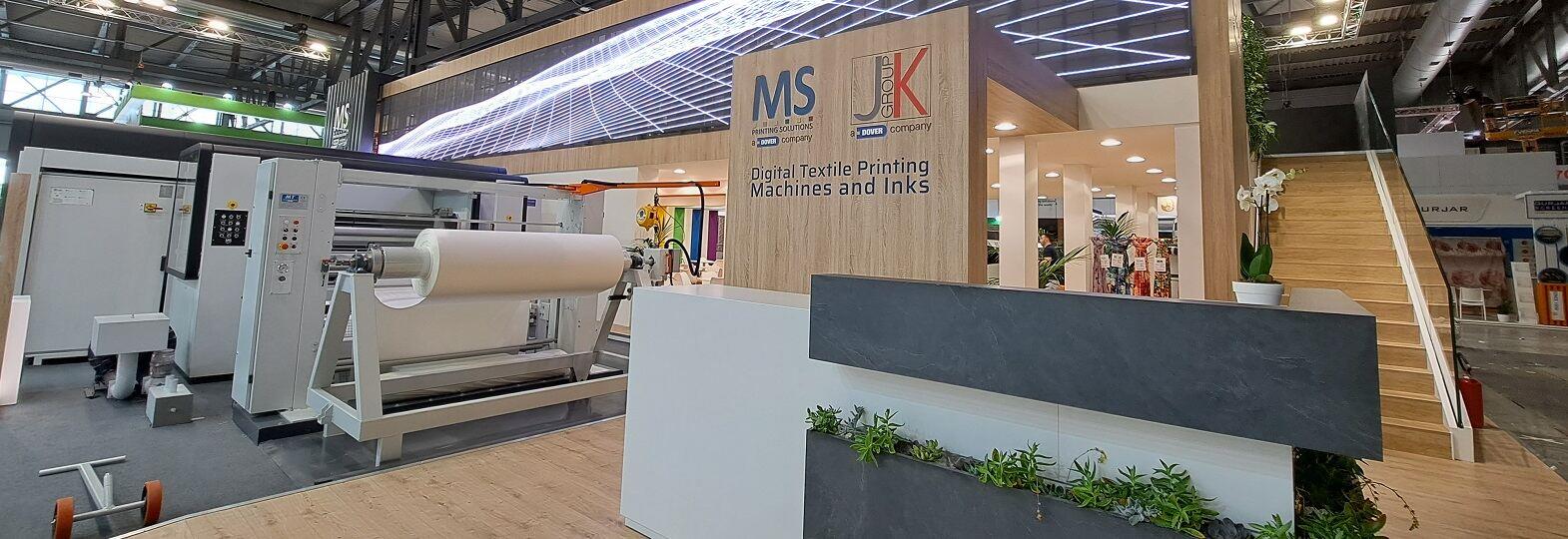ITMA 2023 marked the beginning of a new chapter for the digital printing industry. For the Italian MS PRINTING SOLUTIONS and JK GROUP, brand leaders in this industry, ITMA has been a chance to show the world our latest innovations, created with sustainability as heart. Proposing new and useful technologies is the key to develop the market and keep the industry standard high, together with continuously developing digitalisation and paying attention to sustainability.
Precisely sustainability has been at the centre of our projects for a long time. That’s why we talk about “sustainable innovation” as the light that has been guiding us in our projects in the past few years; it is what our new products are permeated with, and it is evident in what we showed at ITMA.
Among these products, we displayed our Pigment Solution – a whole system – made up of four different components which together have proven to be exceptionally innovative and useful.
Digistar Pigment 4K – JK GROUP’s newest and patent pending digital pigment ink. With a new formula that does not require pre- and post-treatment, it is one of the most environmentally friendly and sustainable ink options, thanks to a 50 per cent reduction of the printing process steps. If compared to the same process made with reactive inks, we have an environmental impact reduced, on average, by 95 per cent; we are talking about decreasing water and energy consumption, but also chemical waste. As per hydric resources impact, for example, we have a reduction of 85 per cent; while when talking about CO2 emission we reach a reduction of about 15 times. These data come from a study developed by Next Technology Tecnotessile Society Nazionale di Ricerca. Digistar Pigment 4K boasts a significant general fastness: as per EN ISO 20315-M (alkaline and acid perspiration) and EN ISO 20615-M (domestic washing at 40 degrees) all tests showed 5 as results. As per EN ISO 2035 (dry and wet rubbing) we have a solid 4 – all while maintaining a high printability. Textile Standard certifications are an extremely concrete and tangible guarantee of the sustainable and ecological production of our latest ink formula and its low hazardous profile: Digistar Pigment 4K is certified Ecopassport (certificate nr 22EP00004) and ZDHC L3.
A completely re-engineered version of MS PRINTING SOLUTIONS’ popular digital scanning printing machine – the JP7 – is another fundamental component of our solution. We have revolutionised our JP7, both in electronics and mechanics, so that in combination with our new water-based pigment ink it could give the best achievable results. The aim was process sustainability, that is why we implemented a new zero-wastewater recirculation system that will internally recycle a previously filtered, fixed amount of water in a dedicated tank. Pigment printing already is a waterless process, the only water involved is the one used to clean the belt, and with this system we reduce the amount of cleaning water up to 95 per cent less.
In addition, the machine has undergone other various improvements. It has been implemented with the Ink Recirculation and the Nozzle Shooting System, both developed to work on IDLE and while printing. These upgrades help the customers to keep the ink always running, therefore avoiding any sedimentation; to keep the nozzles active, as a result there is an improved printing quality; to enhance and maintain a sustainable printheads lifetime. Such enhancements also increase the life of filters and degassers and allow to always offer the same printing quality and nozzles performances within different printing hobs or printing designs, since the Nozzle Shooting System keeps the nozzles active even when they are not used for a specific job or during the night.
Easy-Clean, the new carriage plate, is a further upgrade. It improves the cleaning process of the carriage plate, significantly avoiding damage, while also empowering printing quality and efficiency.
Last but not least, we have also changed JP7 appearance. The new casing is lighter, with an interior space layout made even more rational than before, thus assuring the best positioning of the new electronic and mechanical components.
Gradus, our new dryer designed ad-hoc to work in-line with the system, enables to dry and cure in one step, thus having a unique machine where you can insert a white roll and have it ready to be sold. A faster time to market, an almost print on-demand flow and reduced waste are all collateral effects of this solution. Moreover, Gradus has minimal energy consumption, the best achievable emission control and a modularity that contributes to CO2 emissions reduction in the whole process.
A new software which integrates both calibration and printing software has been designed to make the entire calibration procedure easy and intuitive. The full integration of such software into the system allows to halve the calibration time, increase the colour yield up to 20 per cent and increase the colour’s brightness up to 15 per cent.
With our innovative solution, pigment printing becomes an easy and waterless process, which enables customers to carry out a sustainable production chain, ensuring a cost-effective printing output. One of the main advantages of our solution is being a full inline printing system which makes pigment printing almost on demand, since no time goes by in between the order and the production. Our customers have the chance to exploit this inline system, whose pieces have been developed to work together to maximise their output, with a significant reduction in costs, emissions, energy and water consumption. When we started the project, we also had sustainability in mind: 45 billion of garment, in the fashion industry only, are unsold and wasted every year. This is due to overproduction; companies produce more and more in order to respond to market demands and to exploit the advantages brought by scale economy.
Nowadays, it is fundamental to be careful towards our own environmental impact as companies. Talks about greenwashing are everywhere. Media, activists, researchers, scholars all raise their concerns about what it seems to have become a huge problem of our days. This means that vague statements concerning the green commitment of a company is not being blindly accepted anymore. But what is greenwashing? It not an easy job to define it. This lack of clarity may mislead the members of the textile value chain who would like to rely on truly sustainable partners but have troubles in identifying them. On the other side, customers who are becoming more and more aware of the importance of supporting companies that work transparently, by working for them, buying from them and investing in them, find themselves with little to no guidance at all, in a mare magnum which is extremely difficult to navigate. But, there are some key factors to recognise the authenticity of a company’s commitment to sustainability, such as consistency, tradition, actions and certifications. The next steps companies have to take in this industry are clear: no more time to walk, let’s run to a greener future.










Comments